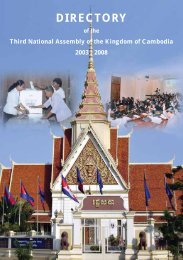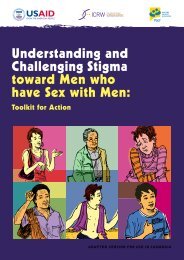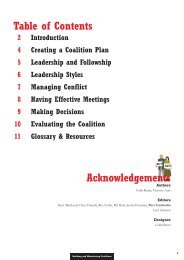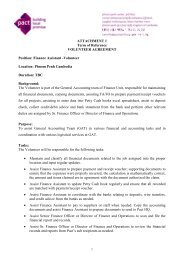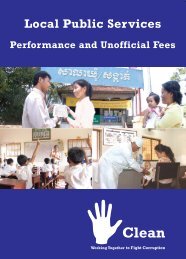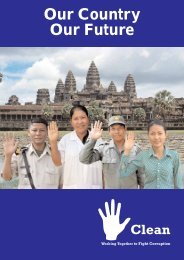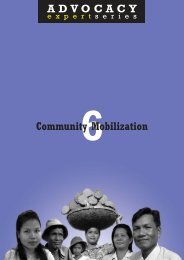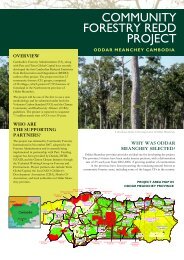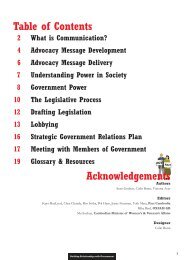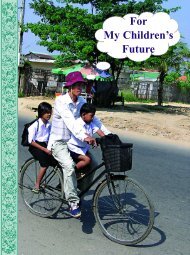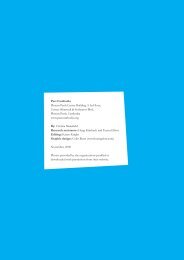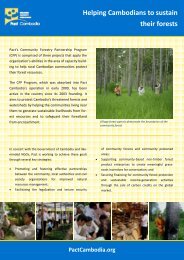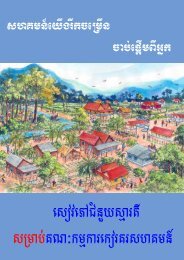Advocacy in Cambodia: Increasing Democratic ... - Pact Cambodia
Advocacy in Cambodia: Increasing Democratic ... - Pact Cambodia
Advocacy in Cambodia: Increasing Democratic ... - Pact Cambodia
You also want an ePaper? Increase the reach of your titles
YUMPU automatically turns print PDFs into web optimized ePapers that Google loves.
drafts <strong>in</strong>corporated <strong>in</strong>to the new Land Law and<br />
enacted <strong>in</strong> August 2001.<br />
Land disputes cont<strong>in</strong>ue to be a problem <strong>in</strong><br />
<strong>Cambodia</strong> and conservative estimates state that<br />
100,000 people are currently <strong>in</strong> a situation <strong>in</strong><br />
which powerful figures are try<strong>in</strong>g to displace them.<br />
Resolutions are rare, particularly <strong>in</strong> cases that<br />
<strong>in</strong>volve the military and/or large companies.<br />
Nevertheless, NGOs and communities are<br />
becom<strong>in</strong>g bolder and legal aid organizations are<br />
ga<strong>in</strong><strong>in</strong>g experience lead<strong>in</strong>g to some small isolated<br />
successes.<br />
Currently the government is draft<strong>in</strong>g subdecrees<br />
that will clarify the Land Law. Of special<br />
concern to NGOs is the composition of the<br />
Cadastral Commission, which will be responsible<br />
for resolv<strong>in</strong>g disputes at the local level. The<br />
government is understandably reluctant to open<br />
the door to civil society participation <strong>in</strong> dispute<br />
resolution, argu<strong>in</strong>g that participation at the local<br />
level will make the system too complex.<br />
Proponents argue that<br />
there is no legal obstacle<br />
to civil society<br />
participation <strong>in</strong> the<br />
Cadastral Commission<br />
and that without it<br />
appo<strong>in</strong>ted officials who<br />
may have vested <strong>in</strong>terest<br />
<strong>in</strong> some land cases would<br />
heavily <strong>in</strong>fluence the<br />
Commission.<br />
Land disputes are<br />
expected to <strong>in</strong>crease as a<br />
planned land title<br />
project moves forward<br />
and titles held or created<br />
by powerful figures are<br />
discovered. While civil<br />
society organizations<br />
have coord<strong>in</strong>ated<br />
strongly on land issues, motivation and<br />
coord<strong>in</strong>ation will have to cont<strong>in</strong>ue <strong>in</strong> order to<br />
engage the government on this sensitive livelihood<br />
issue. (See page 54.)<br />
Garment Labor Movement<br />
The organized garment labor movement took<br />
place <strong>in</strong> two ma<strong>in</strong> phases. The first phase occurred<br />
between 1994 and 1997 when <strong>in</strong>ternational<br />
organizations lobbied the National Assembly and<br />
the M<strong>in</strong>istry of Labor, provided technical<br />
assistance, and sent relevant officials on study<br />
tours. Lobby<strong>in</strong>g strategies <strong>in</strong>cluded a workshop by<br />
an <strong>in</strong>ternational union for 20-30 members of the<br />
National Assembly on the <strong>in</strong>ternational labor<br />
code. The f<strong>in</strong>al Labor Law, passed <strong>in</strong> 1997, was<br />
the comb<strong>in</strong>ed product of a draft produced by the<br />
EMOs held a public forum before the<br />
commune council election <strong>in</strong> Kampong Cham<br />
and <strong>in</strong>vited parliamentarians to participate,<br />
2001.<br />
National Assembly and one produced by the<br />
M<strong>in</strong>istry of Labor.<br />
The second phase started after the Labor Law<br />
passed, whereby focus was shifted to<br />
strengthen<strong>in</strong>g local unions and improv<strong>in</strong>g work<strong>in</strong>g<br />
conditions <strong>in</strong> the factories. These efforts have been<br />
somewhat underm<strong>in</strong>ed by the regular dismissal<br />
of union leaders and the fact that the garment<br />
workers are young, rural women recently moved<br />
to the city, who are <strong>in</strong> need of programs to build<br />
confidence and empowerment before they can<br />
play active roles <strong>in</strong> advocacy. (See page 59.)<br />
Commune Council Election Law<br />
Electoral monitor<strong>in</strong>g organizations (EMOs)<br />
knew from the start that the three objectives they<br />
set regard<strong>in</strong>g the commune council election law<br />
campaign were ambitious, particularly the<br />
objective to switch from a proportional to a direct<br />
electoral system. Unlike most campaigns, this one<br />
has a long-term objective and advocates have not<br />
been deterred by their<br />
failure to secure changes<br />
<strong>in</strong> the draft law before it<br />
was passed. The EMOs<br />
conducted op<strong>in</strong>ion polls<br />
and organized a number<br />
of public forums <strong>in</strong> the<br />
prov<strong>in</strong>ces. They also<br />
organized a march,<br />
participated <strong>in</strong> monthly<br />
Conflict Prevention <strong>in</strong><br />
the <strong>Cambodia</strong>n<br />
Elections (COPCEL)<br />
discussions with<br />
government and party<br />
officials, and obta<strong>in</strong>ed<br />
meet<strong>in</strong>gs with high-level<br />
officials to present their<br />
arguments. At one po<strong>in</strong>t<br />
<strong>in</strong> the process, the<br />
EMOs considered withdraw<strong>in</strong>g from the election<br />
process <strong>in</strong> protest over the proposed role of an<br />
NGO Coord<strong>in</strong>at<strong>in</strong>g Committee (NGOCC) with<strong>in</strong><br />
the M<strong>in</strong>istry of Interior.<br />
The orig<strong>in</strong>al objectives of this campaign were<br />
not met, yet the issue attracted considerable press<br />
through a strategic media campaign. Efforts were<br />
slightly weakened when ideological differences<br />
prevented the EMOs from present<strong>in</strong>g a unified<br />
front at times. The most valuable lesson for these<br />
advocat<strong>in</strong>g organizations, which are not<br />
traditionally community-based NGOs, was the<br />
sense of legitimacy they ga<strong>in</strong>ed from conduct<strong>in</strong>g<br />
the public polls that gave strong credence to<br />
popular demand for a direct electoral system.<br />
Other lessons learned <strong>in</strong>clude the need to th<strong>in</strong>k<br />
more strategically before imply<strong>in</strong>g that the EMOs<br />
Increas<strong>in</strong>g <strong>Democratic</strong> Space<br />
13



